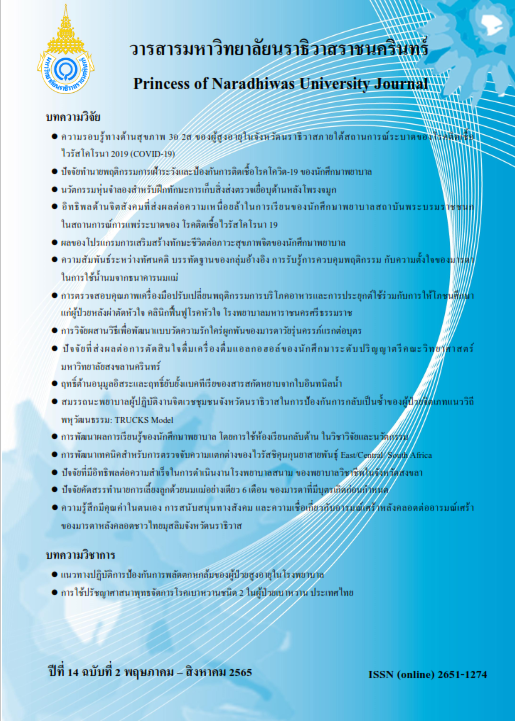Buddhist Philosophy as an Approach to Managing Type 2 Diabetes Mellitus among Diabetic Patient, Thailand
Keywords:
Buddhism, Diabetic management, Type 2 diabetesAbstract
Type 2 Diabetes Mellitus (T2DM) continues to have a substantial and growing impact upon the population of Thailand with over 6 million people, or approximately 11.6% of the population suffering from this chronic disease. Theravada Buddhism is practiced by almost 95% of the Thai population and is an intricately woven part of the social and cultural fabric of the country. Mindfulness Based Stress Reduction (MBSR), derived from Buddhist techniques, has been successfully used to reduce stress, anxiety, depression, and diabetes distress among adults with diabetes. Additionally, mindfulness-based interventions (MBIs) can contribute to better self-care and self-management behaviors which help prevent or delay physiological complications. In addition to being the progenitor to MBSR, Buddhism contains a rational structure embodied within The Four Noble Truths, The Eightfold Path, and belief in Karma or Law of Karma that may be successfully used by Thai persons with T2DM to help manage their disease. This article explores the existing evidences on how core Buddhist principles may be successfully extracted and/or incorporated into strategies augmenting conventional treatments for Thais with T2DM.
References
Anderson, R.J, Freedland, K.E., Clouse, R.E., & Lustman, P.J. (2001). The Prevalence of Comorbid Depression in Adults with Diabetes: A Meta-Analysis. Diabetes Care, 24, 1069–1078.
Armani, K.A., Vahdani, B., Noorbala, A.A., Nejatisafa, A., Arbabi, M., Zenoozian, S., & Nakhjavani, M. (2018). The Impact of Mindfulness-Based Stress Reduction on Emotional Wellbeing and Glycemic Control of Patients with Type 2 Diabetes Mellitus. Journal of Diabetes Research, 1986820.
Beverly, E.A., Ivanov, N.N., Court, A.B., & Fredericks, T.R. (2017). Is Diabetes Distress on Your Radar Screen. The Journal of Family Practice, 66(1), 9-14.
Buddharakkhita, A. (1985). The Dhammapada: The Buddha’s Path of Wisdom (Translated by Archarya Buddharakkhita). Kandy: Sri Lanka, Buddhist Publication Society.
Gainey, A., Himathongkam, T., Tanaka H., & Suksom, D. (2016). Effects of Buddhist Walking Meditation on Glycemic Control and Vascular Function in Patients with Type 2 Diabetes. Complementary Therapies in Medicine, 26, 92-97.
Guo, J., Wang, H., Luo, J., Guo, Y., Xie, Y., Lei, B., Wiley, J., & Whittemore, R. (2019). Factors Influencing the Effect of Mindfulness-Based Interventions on Diabetes Distress: A Meta- Analysis. BMJ Open Diabetes Research & Care, 7(1), e000757.
Jacobson, N.P. (1986). Understanding Buddhism. Carbondale: Southern Illinois University Press.
Kabat-Zinn, J. (2003). Mindfulness-Based Interventions in Context: Past, Present, and Future. Clinical Psychology: Science and Practice, 10(2), 144-156.
Kalra, S., Gagan, P., Grewal, E., Aye, T.T., Waraich, B.K., SweLatt, …, Kalra1, B. (2018). Diabetes Management and the Buddhist Philosophy: toward Holistic Care. Indian Journal of Endocrinology and Metabolism, 22(6), 806-811.
Katon, W.J. (2008). The Comorbidity of Diabetes Mellitus and Depression. The American Journal of Medicine, 121(11), S8-S15.
King, P., Peacock, I., & Donnelly, R. (1999). The UK Prospective Diabetes Study (UKPDS): Clinical and Therapeutic Implications for Type 2 Diabetes. British Journal of Clinical Pharmacology, 48(5), 643–648.
Thomas, M.C. (2014). Glycemic Exposure, Glycemic Control, and Metabolic Karma in Diabetic Complications. Advances in Chronic Kidney Disease, 21(3), 311-317.
Sulukananuruk, C., Jaisanook, W., Muktabhant, B. (2016). Association of Depression and Stress with HbA1c level of Type 2 Diabetic Patients Attending the Diabetes Clinic of Nampong Hospital, Khon Kaen Province. Srinagarind Medical Journal, 31(1), 35-46.
Testa, R., Bonfigli, A.R., Prattichizzo, F, La Sala L, De Nigris V, & Ceriello, A. (2017). The “Metabolic Memory” Theory and the Early Treatment of Hyperglycemia in Prevention of Diabetic Complications. Nutrients, 9(5), 437.
Tunsuchart, K., Lerttrakarnon, P., Srithanaviboonchai, K., Likhitsathian, S., & Skulphan, S. (2020). Type 2 Diabetes Mellitus Related Stress in Thailand. International Journal of Environmental Research and Public Health, 17(7), 2329.
Winston, D. (2016). “A 6-Minute Breathing Meditation to Cultivate Mindfulness”. Retrieved February 26, 2022 from https://www.mindful.org/a-five-minute-breathing-meditation/.
Worowi, S., Varabho, P.W., & Inmoung, P. (2019). Holistic Health Care with Medicinal Dharma Principles of Diabetes Patients in Kantharawichai District, Mahasarrakham Province. Journal of Health Science, 28(Suppl 2), S90-S100.
Downloads
Published
How to Cite
Issue
Section
License
Copyright (c) 2022 Princess of Naradhiwas University Journal

This work is licensed under a Creative Commons Attribution-NonCommercial-NoDerivatives 4.0 International License.




